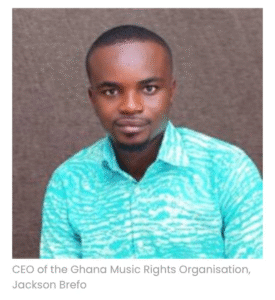GHAMRO CEO Exposes 90% of Media Houses for Dodging Music Royalty Payments
 The Chief Executive Officer of the Ghana Music Rights Organisation (GHAMRO) Jackson Brefo has issued a damning revelation concerning the refusal of most media houses in Ghana to pay royalties owed to musicians. Speaking during a GhanaWeb X Space discussion mornitored by mrwoode.com on May 23, 2025, Brefo disclosed that nearly 90 percent of the country’s broadcasting networks have deliberately ignored their obligations to compensate musicians for the use of their work.
The Chief Executive Officer of the Ghana Music Rights Organisation (GHAMRO) Jackson Brefo has issued a damning revelation concerning the refusal of most media houses in Ghana to pay royalties owed to musicians. Speaking during a GhanaWeb X Space discussion mornitored by mrwoode.com on May 23, 2025, Brefo disclosed that nearly 90 percent of the country’s broadcasting networks have deliberately ignored their obligations to compensate musicians for the use of their work.
Brefo clarified GHAMRO’s role stating that the organisation does not receive financial support from the government. Government does not do any business with GHAMRO. The only relationship government has with GHAMRO is as a regulator he explained. What we do in the public performance space is license musical works by collecting royalties from radio and TV stations.
He pointed out that the often criticised low payouts to musicians such as GH¢100 or GH¢300 are a direct result of the royalties collected which are grossly insufficient due to non-compliance by media houses. Royalty generation is not static. Since we collect royalties from TV and radio stations, we can only distribute what we collect. And as a matter of fact, 90 percent of Ghana’s broadcasting networks have deliberately refused to pay, Brefo stated.
One of the most startling revelations was GHAMRO’s ongoing legal battle with the Ghana Broadcasting Corporation (GBC). According to Brefo, GHAMRO has been in court with GBC for eight years over unpaid royalties dating back to 2014. “Not a dime has been paid from 2014 till date, he emphasized.
To address this long-standing issue, Brefo noted that GHAMRO is currently engaging the National Communications Authority (NCA). The goal is to introduce regulatory measures that will make it mandatory for media houses to settle their public performance royalties with GHAMRO before they can legally generate revenue under NCA licensing.
We are speaking with the NCA to include provisions in their regulations that would require a media house to settle its public performance obligations with GHAMRO before being allowed to generate revenue under the NCA, he revealed.
This disclosure has reignited conversations about fair compensation for musicians, the responsibility of media platforms and the need for stronger regulatory frameworks to protect the intellectual property rights of Ghanaian artists. As GHAMRO pushes for reforms and legal enforcement, many in the music industry are hopeful that justice and sustainability for creatives will no longer be delayed.
